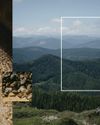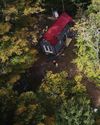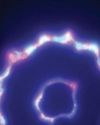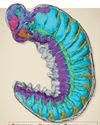
Every morning, Leroy Hood-who goes by Lee-wakes up around 5:30 a.m. He spends the first two hours of his day at his desk-writing, catching up with colleagues, strategizing his next big project. Then he begins his 40-minute workout routine: 200 push-ups, 100 sit-ups, 100 deep-knee bends, followed by a series of stretches and balance exercises. He takes 25 supplements, like vitamins C and D, zinc, and magnesium, and skips breakfast as part of an intermittent-fasting routine. After that, he walks about a mile to his office in Seattle.
Hood, who is 84, is at the forefront of a movement to overhaul healthcare. Technically speaking, he is the co-founder of the Institute of Systems Biology (ISB), a biomedical research group, and the CEO of Phenome Health, a health-technology nonprofit. But what he really is, above all else, is a man with a mission. Hood spends his days on calls with scientists, senators, philanthropists, and tech giants, trying to transform healthcare systems across the globe by making them better at preventing diseases, rather than reacting to them. That way, we can all live a little longer.
When he returns from work, Hood pursues one of his many hobbies. He reads roughly a book a week, an eclectic mix of spy novels, Westerns, and of course, the latest nonfiction on how to live to be 100. He plays folk music on his recorder and takes long, meandering hikes. At 7 p.m. he eats dinner-usually a wholesome combination of leafy greens, whole grains, and fresh fruit with his partner, Becky, then goes to sleep around 10:30. Then the cycle repeats.
この記事は Popular Mechanics US の July - August 2023 版に掲載されています。
7 日間の Magzter GOLD 無料トライアルを開始して、何千もの厳選されたプレミアム ストーリー、9,000 以上の雑誌や新聞にアクセスしてください。
すでに購読者です ? サインイン
この記事は Popular Mechanics US の July - August 2023 版に掲載されています。
7 日間の Magzter GOLD 無料トライアルを開始して、何千もの厳選されたプレミアム ストーリー、9,000 以上の雑誌や新聞にアクセスしてください。
すでに購読者です? サインイン

ONE OF THE 'GREATEST THREATS' TO THE PACIFIC NORTHWEST ISN'T WHAT YOU THINK.
EXPERTS ARE PREPARING THE REGION AGAINST THE THREAT OF DANGEROUS VOLCANIC MUDFLOWS, KNOWN AS LAHARS, WHICH COULD INUNDATE THE COMMUNITIES SURROUNDING MT. RAINIER IN AS LITTLE AS 30 MINUTES.

THE WORLD'S TOUGHEST ROW
They rowed 3,000 miles across the Atlantic, battling unpredictable weather, chaotic seas, and finicky equipment. But what they discovered gave them profound new insights into the power of the ocean.

HOW TO DIY OFF-GRID SOLAR
SPEND THE TIME UP FRONT AND PLAN IT CAREFULLY TO AVOID DISAPPOINTMENT

Are We on the Verge of an ARMS RACE in SPACE?
RUMORS OF A RUSSIAN SPACE NUKE, ALONG WITH OTHER SATELLITE-TARGETING WEAPONS, HAVE MADE GEOPOLITICAL TENSIONS EXTEND INTO ORBIT.

Fresh Fingerprints on an Ancient Statue
A CLAY FIGURINE HAS SPENT MILLENNIA incomplete, waiting at the bottom of a lake for its long-dead craftsman to finish the Iron Age-era statuette.

Quantum Entanglement in Our Brains
IT HAS LONG BEEN ARGUED THAT THE human brain is similar to a computer. But in reality, that's selling the brain pretty short.

The Tools of Copernicus
WAY BACK IN 1508, WITH ONLY LIMited tools at his disposal, Nicolaus Copernicus developed a celestial model of a heliocentric planetary system, which he described in hist landmark work De revolutionibus orbium coelestium. It was a complete overhaul of our conception of the universe-one that, unfortunately, earned him the ire of the Catholic church for decades after his death-and forever changed the way we look at the stars.

Building a Sixth-Generation Bomber Raptor
THE GLOBAL COMBAT AIR Programme (GCAP)-a project by the U.K., Italy, and Japan to develop a sixth-generation stealth fighter-has been busy at the drawing board reshaping its vision of the future of air warfare. And judging by the new concept model unveiled at this year's Farnborough air show, that future has big triangular wings.

The Electroweak Force of the Early Universe
TODAY, THE UNIVERSE AS WE KNOW IT IS governed by four fundamental forces: the strong nuclear force, the weak nuclear force, electromagnetism, and gravity.

This Ancient Fossil With a Brain and Guts
WE KNOW WHAT FOSSILS LOOK like. For example, typical dinosaur fossils are bones turned to stone and preserved from the passage of time, located, if we're particularly lucky, in large collections that can be reassembled to represent the beast they used to prop up in their entirety.